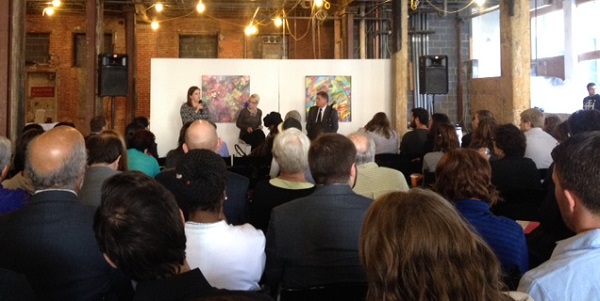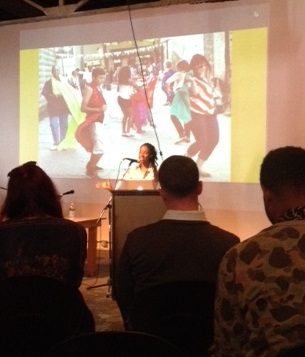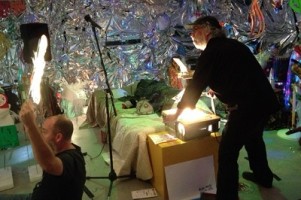
UIX Discussion: A philanthropic perspective on designing cities
As the city government continues to get itself sorted out (Detroit passed a resolution last week to return powers to elected officials but keep the emergency manager in control of the city’s bankruptcy process), residents and visitors keep doing what they’ve been doing: being innovative, creative, and promoting community.
Last week, the Urban Innovation Exchange (UIX) hosted an event in Detroit as a way to advance the city’s innovation movement. They hosted a series of talks, presentations, and tours to highlight ways residents in cities around the country are improving their communities one small project at a time.
Small has a big impact
At Wednesday’s forum, The Art of Place, attendees heard from 11 creative leaders who are spearheading unique placemaking projects. Organizers from Detroit SOUP, The Alley Project, and others represented some of the city’s innovative projects, but the audience also got to hear about interesting projects across the country. To highlight a few:

UIX Presentation: The art of placemaking
CoSIGN Cincy is a way to change the perception of a neighborhood by allowing artists to create new signs for local businesses in Cincinnati. Organizers hosted a competition that paid for the development of the top-10 signs.
The project’s ability to connect unlikely people – artists, business owners, engineers, city zoning officials, and the greater community – makes it a great placemaking project that has a clear impact on the area’s local economy. Not only do new, unique signs improve the streetscape’s aesthetics, some owners said foot traffic nearly doubled after the sign was installed.
Eve Picker is active in the fields of design, architecture, and community and real estate development. She founded CityLAB in Pittsburgh (a self-described as “a do tank, not a think tank”) and smallchange.com, a new real estate crowdfunding platform to raise equity for transformational real estate projects. In her UIX presentation, she walked us through the costs and returns of small, community-led projects (such as a street market) vs. those of large, top-down projects (such as an athletics stadium). Eve urged the audience to help change the way our elected officials think about change, and do what we can to support the more creative, innovative, and small community-led initiatives.
Food, education, and entrepreneurship

Dlectricity: Artists projecting images on a garage near the Museum of Contemporary Art Detroit
At UIX’s Thursday forum, The Future of Food, a variety of food entrepreneurs and food access advocates shared their successes and lessons to an engaged audience.
Sustainability was the main focus of the speakers from the CDC Farm & Fishery (Detroit), Rid-All Green Partnership (Cleveland), and Tiny Diner (Minneapolis): the two former being urban farming and aquaponics operations and the latter being a neighborhood food system in the form of a restaurant.
Education was a large part of most of the featured programs, bringing together equity and health. The Food Trust (Philadelphia), Food Revolution Cooking Club (Pittsburgh), and Detroit Food Academy (Detroit) are active with youth and often work in schools to educate students about nutrition and cooking. FoodLab Detroit and (revolver) (Hamtramck) offer new venues to showcase food entrepreneurs and engage the community.
There was clear consensus and optimism among the speakers to move away from an industrialized, one-size-fits-all food system for local, customized networks that consider social and environmental costs.
Making place with art

Dlectricity: Light stage on Warren and Woodward
Detroit also hosted annual creative events last week, the Detroit Design Festival and Dlectricity. With more than 50 art displays or discussions throughout the week, the city’s Midtown and Downtown was full of activity, art, and people. Arts and culture are essential components of a thriving, knowledge-based economy. A healthy creative sector attracts and retains residents and businesses, and produces economic benefits.
Detroit seemed to be the champion of placemaking last week: the city prioritized people, place, conversation, and creativity. All components of a healthier, more vibrant city.